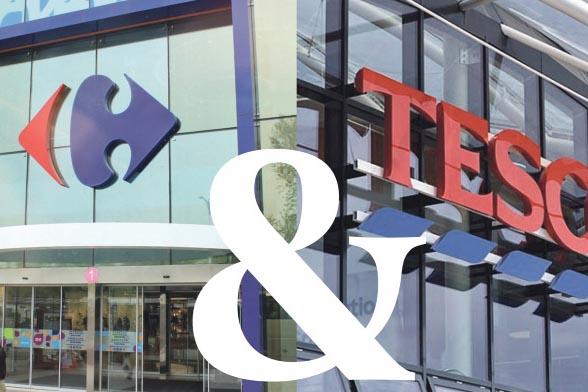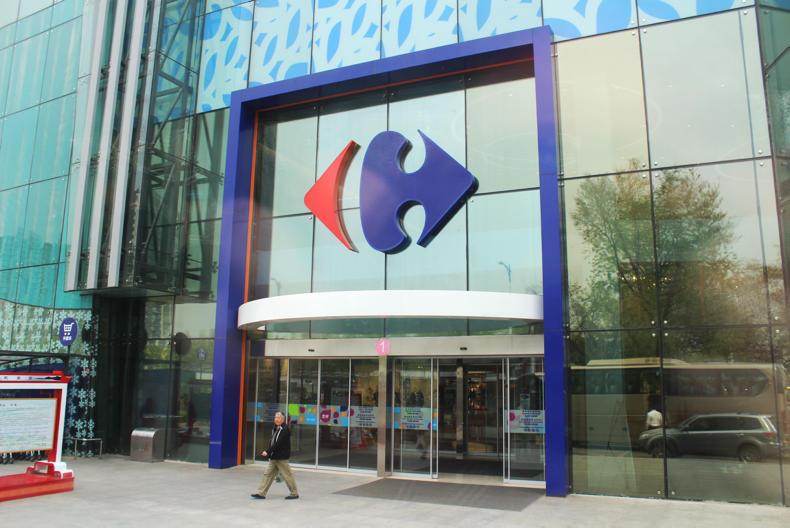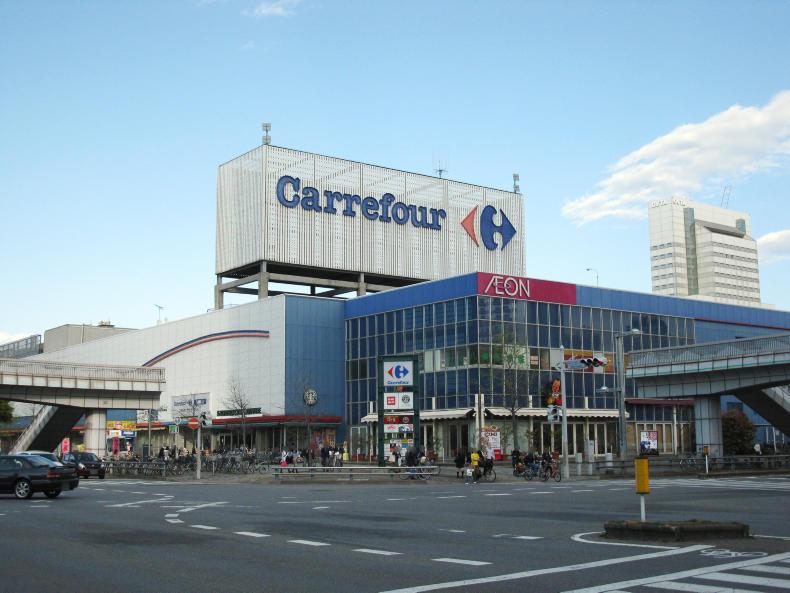Two of Europe’s largest supermarket groups, Tesco and Carrefour, have announced that they will combine their buying of own-label produce for an initial period of three years.
The supermarkets are describing this as a “strategic alliance” that will cover the relationship with global suppliers and it will “enable both companies to improve the quality and choice of products available to their customers, at even lower prices.” At the same time they say that the arrangement “will also allow both companies to strengthen their relationships with their suppliers and create significant opportunities for those suppliers.”
This follows the recent announcement by J Sainsbury and ASDA, the second and third largest supermarkets in the UK, that they would merge, and represents further consolidation in the retail sector. Commenting on this, Cormac Healy from Meat Industry Ireland said: "If part of the stated objective is to deliver lower prices to consumers, then this adds to the existing pressures on suppliers down the chain. It further heightens the concerns of food producers and processors in relation to consolidation in buying power that is stated as primarily aimed at squeezing buying prices."
A supplier could be enticed to drive prices lower on the basis that they would expand their business to both retailers where they had been serving just one before
Tesco is a major buyer of Irish beef and lamb, while Carrefour, like other French retailers, has focused on French-origin beef in response to farmer protests a few years ago. Irish beef sales to Carrefour and other French retailers are low at present, concentrated on promotions, but were huge in the past. They continue to be major buyers of Irish lamb as France produces less than half the lamb it consumes. Imports from the UK, Ireland, and New Zealand make up the deficit with little controversy.
Driver of mergers and alliances
Retailer pressures
What is known as big-box retailing is proving vulnerable to two major threats. First is the use of technology in retail, with online sales really affecting the high-street trade in clothes, books and electrical goods and best demonstrated by the phenomenal growth of Amazon. This trend will continue as technology and distribution channels develop, with fresh food, the staple of supermarket retailers, coming under increasing pressure.
There is real concern that the larger store format is particularly vulnerable. The idea of a large weekly shop is going out of fashion, as is the notion of food preparation in the home. Consumers are more likely to shop for food on a meal-by-meal basis in a convenience store or indeed use online food delivery solutions.
Discounters
The second major threat to the established retail sector in Ireland, the UK and across the EU is the rapid growth of what are described as the discount retailers. The most famous examples are the German-based Aldi and Lidl, which have been growing rapidly over the past decade. Their model has been based on a smaller store format carrying a much smaller range of goods than either Tesco or Carrefour, and an ability to sell at much lower prices and capture market share. As consumers have moved away from a large weekly or monthly one-stop shop, the discounter model has found favour, with convenience stores complementing their offering.
To stem the flow of business to these discounters, mainstream supermarkets have had to cut prices which in turn has hit the profit margins, in the case of Tesco falling from 5% to 3% over the past decade.
What the alliance means for Irish farmers?
Farmer’s correctly become concerned when they hear of a supermarket initiative that is designed to give their customers lower prices. This is pointed out by Meat Industry Ireland in its comment to the Irish Farmers Journal. The clue to what the alliance really means can be found in its core purpose: to “enable both companies to improve the quality and choice of products available to their customers, at even lower prices”.
While there may be some distribution and purchasing efficiencies, particularly in not for resale consumable products, it seems inevitable that there will be some squeeze on suppliers. Indeed, there could be a winner-takes-all scenario where a supplier could be enticed to drive prices lower on the basis that they would expand their business to both retailers where they had been serving just one before.
Read more
Tesco and Carrefour purchasing alliance could damage food suppliers
Tesco signs purchasing deal with French retailer Carrefour
Two of Europe’s largest supermarket groups, Tesco and Carrefour, have announced that they will combine their buying of own-label produce for an initial period of three years.
The supermarkets are describing this as a “strategic alliance” that will cover the relationship with global suppliers and it will “enable both companies to improve the quality and choice of products available to their customers, at even lower prices.” At the same time they say that the arrangement “will also allow both companies to strengthen their relationships with their suppliers and create significant opportunities for those suppliers.”
This follows the recent announcement by J Sainsbury and ASDA, the second and third largest supermarkets in the UK, that they would merge, and represents further consolidation in the retail sector. Commenting on this, Cormac Healy from Meat Industry Ireland said: "If part of the stated objective is to deliver lower prices to consumers, then this adds to the existing pressures on suppliers down the chain. It further heightens the concerns of food producers and processors in relation to consolidation in buying power that is stated as primarily aimed at squeezing buying prices."
A supplier could be enticed to drive prices lower on the basis that they would expand their business to both retailers where they had been serving just one before
Tesco is a major buyer of Irish beef and lamb, while Carrefour, like other French retailers, has focused on French-origin beef in response to farmer protests a few years ago. Irish beef sales to Carrefour and other French retailers are low at present, concentrated on promotions, but were huge in the past. They continue to be major buyers of Irish lamb as France produces less than half the lamb it consumes. Imports from the UK, Ireland, and New Zealand make up the deficit with little controversy.
Driver of mergers and alliances
Retailer pressures
What is known as big-box retailing is proving vulnerable to two major threats. First is the use of technology in retail, with online sales really affecting the high-street trade in clothes, books and electrical goods and best demonstrated by the phenomenal growth of Amazon. This trend will continue as technology and distribution channels develop, with fresh food, the staple of supermarket retailers, coming under increasing pressure.
There is real concern that the larger store format is particularly vulnerable. The idea of a large weekly shop is going out of fashion, as is the notion of food preparation in the home. Consumers are more likely to shop for food on a meal-by-meal basis in a convenience store or indeed use online food delivery solutions.
Discounters
The second major threat to the established retail sector in Ireland, the UK and across the EU is the rapid growth of what are described as the discount retailers. The most famous examples are the German-based Aldi and Lidl, which have been growing rapidly over the past decade. Their model has been based on a smaller store format carrying a much smaller range of goods than either Tesco or Carrefour, and an ability to sell at much lower prices and capture market share. As consumers have moved away from a large weekly or monthly one-stop shop, the discounter model has found favour, with convenience stores complementing their offering.
To stem the flow of business to these discounters, mainstream supermarkets have had to cut prices which in turn has hit the profit margins, in the case of Tesco falling from 5% to 3% over the past decade.
What the alliance means for Irish farmers?
Farmer’s correctly become concerned when they hear of a supermarket initiative that is designed to give their customers lower prices. This is pointed out by Meat Industry Ireland in its comment to the Irish Farmers Journal. The clue to what the alliance really means can be found in its core purpose: to “enable both companies to improve the quality and choice of products available to their customers, at even lower prices”.
While there may be some distribution and purchasing efficiencies, particularly in not for resale consumable products, it seems inevitable that there will be some squeeze on suppliers. Indeed, there could be a winner-takes-all scenario where a supplier could be enticed to drive prices lower on the basis that they would expand their business to both retailers where they had been serving just one before.
Read more
Tesco and Carrefour purchasing alliance could damage food suppliers
Tesco signs purchasing deal with French retailer Carrefour






 This is a subscriber-only article
This is a subscriber-only article












SHARING OPTIONS: